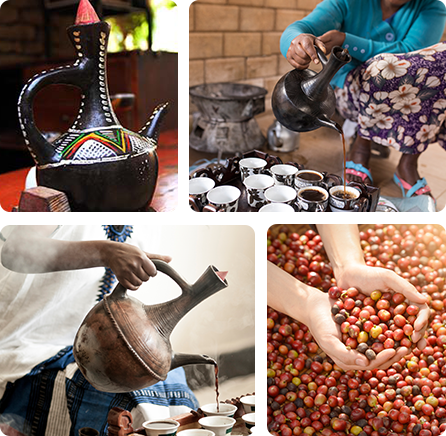The coffee ceremony stems from an interesting tale of how coffee was born in Ethiopia.
“It is the culture, in each household, every day. And we want to share that, the tradition and the culture.”

The beautiful and unique coffee ceremony is a tradition in Ethiopia which takes time to celebrate friendship, hospitality, and respect. If you are offered an Ethiopian coffee ceremony, your obligations as a guest are simple – accept, enjoy, and don’t rush off anywhere else. The coffee ceremony is an art form. It is considered courteous to present the hostess with a small gift.
The ceremonial preparation of coffee is usually performed by a young woman who wears an elegant white cotton dress embroidered upon its borders and hem with colourful patterns. Her hair will often be dressed in traditional shuruba braids, which are intricate patterns worked close to the scalp. A home will often be prepared with fresh grass strewn on the floor, which symbolises abundance.
Firstly, she burns frankincense to rid the air of evil spirits and cleanse the atmosphere. In the presence of guests, she roasts green beans in a skillet above an open fire or stove. The beans are shaken regularly to prevent scorching. Soon, the delicious aromas of roasting coffee beans fill the air.
When the sizzling coffee oils begin to make a popping sound the hostess will remove the skillet from the flame and bring the smoking beans toward the guests for them to appreciate the aroma, which is the guests’ cue to compliment. The dark beans are now ground by hand with mukecha and zenezena stick, or mortar and pestle and the ground coffee transferred to a jebena, a clay pitcher with a bulbous round bottom for holding the brewed coffee, a long stem, and a narrow spout.
The jebena is filled with water and set upon the fire to boil. The guests relax, chat, and eat traditional snacks such as fendisha – popcorn – and kolo or dry, roasted grain.
Often the coffee will be decanted and re-brewed three times before it is deemed ready. Now, the hostess brings out a traditional wooden tray of bunna or coffee cups called sinis and skilfully pours the coffee from a height of about a foot into the cups so that it bubbles and froths. Usually the strong black coffee is served with plenty of sugar, but the countryside you might be served salt or butter. Smile and enjoy!
It is traditional to serve three rounds of the small sinis. Each time the hostess should be complimented on the quality, taste and preparation of the coffee. These are known as abal, tona and Baraka, which some say represent the elevation of spirit experienced by the drinker. Baraka means ‘blessing,’ and in this way, the guest is being blessed by enjoying the coffee ceremony together with their hosts.


